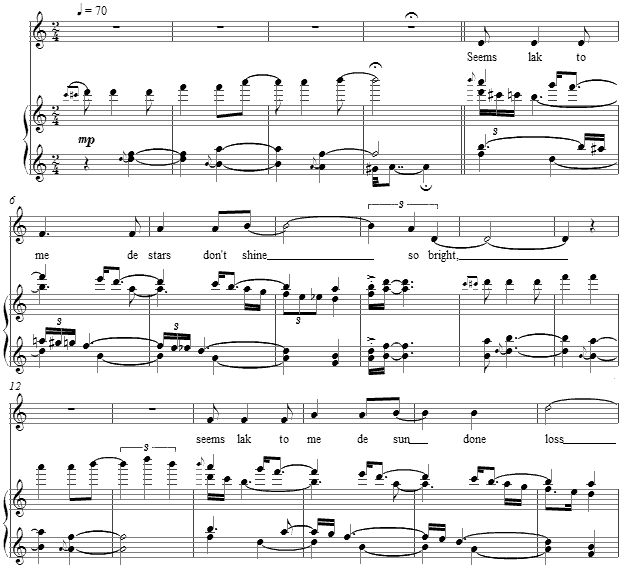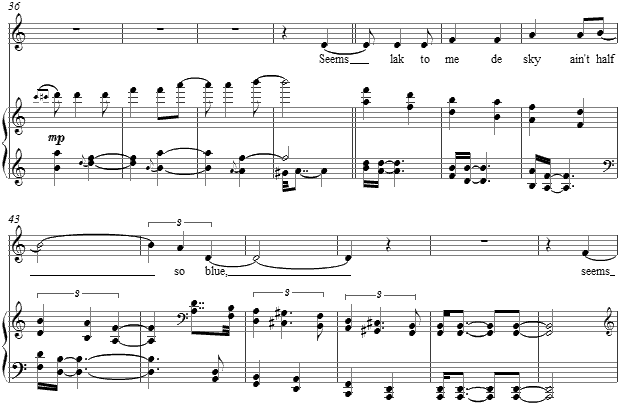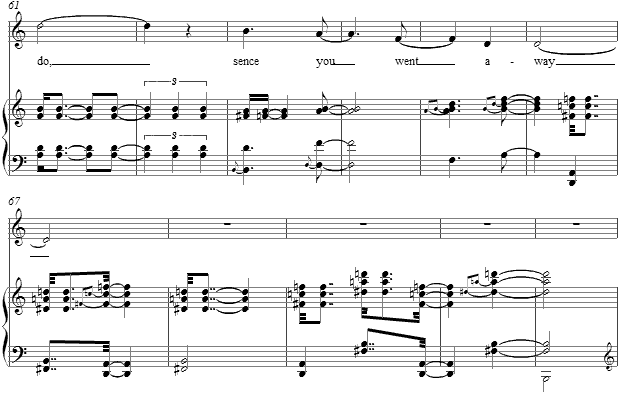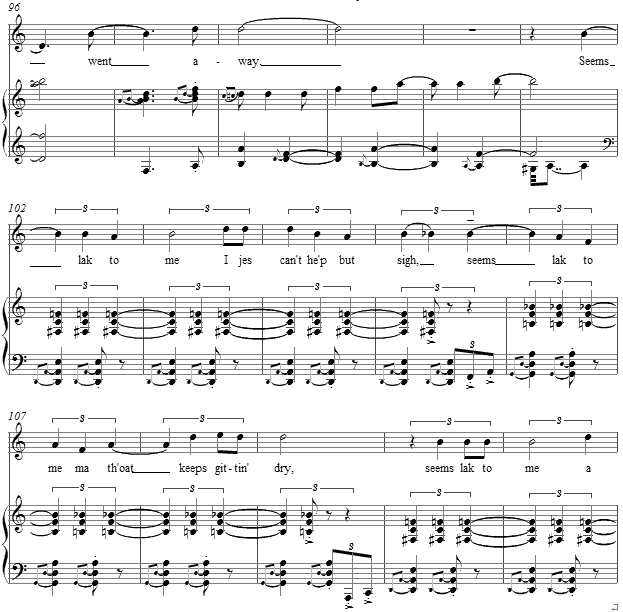Music and Texts of GARY BACHLUND
Vocal Music | Piano | Organ | Chamber Music | Orchestral | Articles and Commentary | Poems and Stories | Miscellany | FAQs
Sence You Went Away - (2008)
James Weldon Johnson
for medium voice and piano
Seems lak to me de stars don't shine so bright,
Seems lak to me de sun done loss his light,
Seems lak to me der's nothin' goin' right,
Sence you went away. [ 1 ]
Seems lak to me de sky ain't half so blue,
Seems lak to me dat ev'ything wants you,
Seems lak to me I don't know what to do,
Sence you went away.
Seems lak to me dat ev'ything is wrong,
Seems lak to me de day's jes twice es long,
Seems lak to me de bird's forgot his song,
Sence you went away.
Seems lak to me I jes can't he'p but sigh,
Seems lak to me ma th'oat keeps gittin' dry,
Seems lak to me a tear stays in ma eye,
Sence you went away.[ 6 pages, circa 4' 05" ]
James Weldon Johnson
Johnson's own biographical sketch which he included along with many other poets in The Book of American Negro Poetry, 1922, reads: "Born at Jacksonville, Fla., 1871. He was educated in the public schools of Jacksonville, at Atlanta University and at Columbia University. He taught school in his native town for several years. Later he came to New York with his brother, J. Rosamond Johnson, and began writing for the musical comedy stage. He served seven years as U. S. Consul in Venezuela and Nicaragua. Author of The Autobiography of an Ex-colored Man (1812), Fifty Years and Other Poems (1917), and the English libretto to Goyescas, the Spanish grand opera, produced at the Metropolitan Opera House in 1915." For a longer and more detailed biography, there are several easily available through other sites which tell much more of this accomplished poet and anthologist.
In addition to the fine anthology of which he was both editor and contributor, The Book of American Negro Poetry (1922), Johnson published The Book of American Negro Spirituals (1925), and The Second Book of Negro Spirituals (1926), and his second collection of poetry, God's Trombones: Seven Negro Sermons in Verse, which appeared in 1927 and marked his last significant creative endeavor. Before this time however, he also wrote song lyrics, for which his brother composed music, including "Lift Every Voice and Sing," which subsequently came to be known as the "Negro National Anthem." A less well known side to Johnson's life was his part in "Cole and Johnson Brothers," a collaboration that flourished in the first decade of the twentieth century, when he wrote lyrics to over two hundred popular songs.
Among poets Johnson encouraged and through his anthology offered their poems as inspiration for my own songs and cycles, there are these in my portfolio to date: James Edwin Campbell, in five song setting titled Echoes from the Cabin; Daniel Webster Davis' Hog Meat; George Reginald Margetson's Every man; Georgia Douglas Johnson fine poems which I titled Four Songs of a Woman, and Joseph S. Cotter Jr.'s A Prayer. As with a number of Johnson's poets, one feature of Johnson's own poetry of this time (1922) was the use of a common man's dialect, spelled with certain variants to capture a culture, time and place. In a similar vein, last year in Charleston I purchased a fascinating quasi-English language bible translated into the Gullah dialect. [ 2 ] Johnson chose for his own artistic purposes in this poem to use such a patois.
The setting is "on" D with the raised sixth of the scale, such that the tessitura is bounded at the bottom by that scale note.
After a short introduction, the many variants of the same chord as shown in the above map are arrived at by falling chromatic lines in a four note texture in which the same chord in many voicings and inversions fills a lengthy span of many measures length. The architecture of the vocal line is a restatement of its arch by successively rising thirds according to the "map." As the accompaniment descends further, the vocal line rises further.
The second verse adopts a different set of voice leading, yet to the same end and with the same four note chord, sometimes decorated with non-harmonic "spice."
The chord implies D minor and also B half diminished seventh, and as a result the setting settles into bridge material between verses utilizing the same major-minor seventh chord form to cite D and B.
The third verse revisits the first's, now transposed an octave lower.
A last verse breaks from the expected vocabulary as set by the three previous verses, and cites the major-minor seven chord in a blues-like texture including the second phrase in the subdominant per the standard blues form.
The score for Sence You Went Away is available as a free PDF download, though any major commercial performance or recording of the work is prohibited without prior arrangement with the composer. Click on the graphic below for this piano-vocal score.
NOTES
[ 1 ] "Sence" gives the sense of pronunciation for "since," as does "jes" for "just," "de" and "dat" for "the" and "that," and so on. The purpose of this clever spelling is to capture the sound as well as general sense captured thereby. The use of alternative spelling is not unusual, for many poets across generations have used such craft to convey the sound of speech irregularities and cultural nuances, most notably E. E. Cummings who often used this same technique.
[ 2 ] Gullah refers to both black American descendants of slaves living on the Sea or in the coastal regions of South Carolina, Georgia, and northeast Florida, as well as to the creolized English spoken by these people.
That authors and, to some extent translators, write in dialect is neither new nor unusual. There are simply so many examples to cite as proof that only a few from several eminent authors proves the point conclusively. Eugene O’Neill’s 1924 play All God’s Chillun Got Wings takes its dialect from the Negro spiritual of the same name. But long before, Charles Dickens wrote in dialect to capture a sense of the culture in The Lazy Tour of Two Idle Apprentices, writing: "Ey!" said the landlady, "I ca' him so. A' cooms efther nae doctor that I ken. Mair nor which, a's just THE doctor heer."
Mark Twain (Samuel Clemens) penned the following snippet of conversation in dialect and so much more in Huckleberry Finn: "GIT up! What you 'bout?" And in another dialect, he writes of advice to the streetcar conductor: "Punch in the presence of the passenjare!" Joel Chandler Harris wrote in The Wonderful Tar Baby Story: "'You er stuck up, dat's w'at you is,' says Brer Rabbit, sezee, 'en I'm gwine ter kyore you, dat's w'at I'm a gwine ter do," sezee." One of the most famous instances of what is technically termed "eye dialect" is found in George Bernard Shaw's Pygmalion as the Flower Girl says: "Ow, eez ye-ooa san, is e? Wal, fewd dan y' de-ooty bawmz a mather should, eed now bettern to spawl a pore gel's flahrzn than ran awy atbaht pyin. Will ye-oo py me f'them?"
Of the more modern poets, E. E. Cummings showed fine examples of using orthography to capture dialect, such as in his poem whose first lines read in part: "oil tel duh woil doi sez / dooyuh unnurs tanmih eesez pullih nizmus tash,oi / dough un giv uh shid oi sez."
Johnson, in his preface to The Book of American Negro Poetry, wrote of the "Negro dialect" and of one of the contributors to that anthology, Paul Laurence Dunbar:
"Dunbar's fame rests chiefly on his poems in Negro dialect. This appraisal of him is, no doubt, fair; for in these dialect poems he not only carried his art to the highest point of perfection, but he made a contribution to American literature unlike what any one else had made, a contribution which, perhaps, no one else could have made. Of course, Negro dialect poetry was written before Dunbar wrote, most of it by white writers; but the fact stands out that Dunbar was the first to use it as a medium for the true interpretation of Negro character and psychology. And, yet, dialect poetry does not constitute the whole or even the bulk of Dunbar's work. In addition to a large number of poems of a very high order done in literary English, he was the author of four novels and several volumes of short stories.
"Indeed, Dunbar did not begin his career as a writer of dialect. I may be pardoned for introducing here a bit of reminiscence. My personal friendship with Paul Dunbar began before he had achieved recognition, and continued to be close until his death. When I first met him he had published a thin volume, "Oak and Ivy," which was being sold chiefly through his own efforts. "Oak and Ivy" showed no distinctive Negro influence, but rather the influence of James Whitcomb Riley. At this time Paul and I were together every day for several months. He talked to me a great deal about his hopes and ambitions. In these talks he revealed that he had reached a realization of the possibilities of poetry in the dialect, together with a recognition of the fact that it offered the surest way by which he could get a hearing. Often he said to me: "I've got to write dialect poetry; it's the only way I can get them to listen to me." I was with Dunbar at the beginning of what proved to be his last illness. He said to me then: "I have not grown. I am writing the same things I wrote ten years ago, and am writing them no better." His self-accusation was not fully true; he had grown, and he had gained a surer control of his art, but he had not accomplished the greater things of which he was constantly dreaming; the public had held him to the things for which it had accorded him recognition. If Dunbar had lived he would have achieved some of those dreams, but even while he talked so dejectedly to me he seemed to feel that he was not to live. He died when he was only thirty-three."As to this "Negro dialect" as Johnson speaks of Dunbar's work, here is an example from Dunbar's An Indignation Dinner:
Dey was hard times jes fo' Christmas round our neighborhood one year;
So we held a secret meetin', whah de white folks couldn't hear,
To 'scuss de situation, an' to see what could be done
Towa'd a fust-class Christmas dinneh an' a little Christmas fun.Therefore, with so many fine examples of this form of writing -- whether one term it "dialect poetry" or "eye dialect" or some other academic distinction -- there should be no question that dialect poetry is the capture of a time, place and cultural flavor without which that poetry (or prose) might never function with the power and flavor with which such works delight us.





